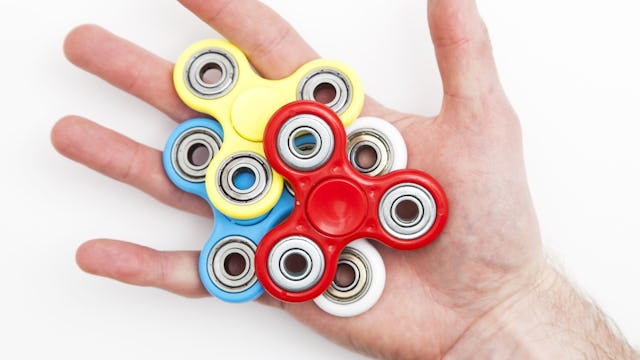FYI, There's No Evidence That Fidget Spinners Help With ADHD

They may be fun for kids, but there is no evidence that fidget spinners help with ADHD
Fidget spinners are the latest craze for kids, sweeping homes and schools everywhere. For many manufacturers producing the three-pronged wonder, they’re hyped as miracle toys that can help people with everything from focusing attention to post-traumatic stress and other disorders. The problem with these claims is that they aren’t backed up by science, creating false expectations and inaccurate advertising for buyers.
By now, we’ve all heard teachers complaining that the toys are causing problems in the classroom. My 11-year-old son and all of his friends are obsessed with fidget spinners. When I asked his teacher about them though, I got a very different opinion. “In general quiet fidgets are fine but the ones that make noise? Who invented those? They are very disturbing,” Pam Doerr, a fifth grade teacher at Redtail Ridge Elementary in Minnesota said. “I don’t like them because they have become an added distraction to most kids. Personally I hope the spinners go away. They have been a real problem this year.”
In addition to the chaos they are creating in classrooms, many retailers are targeting parents under the guise that they help reduce anxiety and can improve attention in children. But according to Scott Kollins, clinical psychologist and professor at Duke University, “there’s no evidence to support that claim,” NPR reports.
Kollins says that, to date, there has been no research shown that proves fidget spinners are effective at addressing those issues. “I know there’s lots of similar toys, just like there’s lots of other games and products marketed toward individuals who have ADHD, and there’s basically no scientific evidence that those things work across the board,” Kollins says.
This does not mean parents whose children have seen improvements in concentration and attention should forego the spinners altogether. But retailers who advertise them as such may not be telling the whole truth if they claim there is research to back it up.
According to the Centers for Disease Control and Prevention, as of 2011 as many as 6.4 million children between the ages of four and 17 had been diagnosed with ADHD. They also say that behavior therapy is the recommended first line treatment for ADHD in young children.
Kollins says that because of the sheer number of children with ADHD, a lot of parents are looking for help, making them vulnerable to false advertising. “If their description says specifically that this can help for ADHD, they’re basically making false claims because these have not been evaluated in proper research,” Kollins explains.